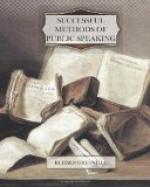Requirements of Effective Speaking
There are certain requirements in public speaking which you and every other speaker must observe. You must be grammatical, intelligent, lucid, and sincere. These are essential. You must know your subject thoroughly, and have the ability to put it into pleasing and persuasive form.
But beyond these considerations there are many things which must be left to your temperament, taste, and individuality. To compel you to speak according to inflexible rules would make you not an orator but an automaton.
The temperamental differences in successful speakers have been very great. One eminent speaker used practically no gesture; another was in almost constant action. One was quiet, modest, and conversational in his speaking style; another was impulsive and resistless as a mountain torrent.
It is safe to say that almost any man, however unpretentious his language, will command a hearing in Congress, Parliament, or elsewhere, if he gives accurate information upon a subject of importance and in a manner of unquestioned sincerity.
You will observe in the historical accounts of great orators, that without a single exception they studied, read, practised, conversed, and meditated, not occasionally, but with daily regularity. Many of them were endowed with natural gifts, but they supplemented these with indefatigable work.
Well-known Speakers and Their Methods
Chalmers
There is a rugged type of speaker who transcends and seemingly defies all rules of oratory. Such a man was the great Scottish preacher Chalmers, who was without polished elocution, grace, or manner, but who through his intellectual power and moral earnestness thrilled all who heard him.
He read his sermons entirely from manuscripts, but it is evident from the effects of his preaching that he was not a slave to the written word as many such speakers have been. While he read, he retained much of his freedom of gesture and physical expression, doubtless due to familiarity with his subject and thorough preparation of his message.
John Bright
You can profitably study the speeches of John Bright. They are noteworthy for their simplicity of diction and uniform quality of directness. His method was to make a plain statement of facts, enunciate certain fundamental principles, then follow with his argument and application.
His choice of words and style of delivery were most carefully studied, and his sonorous voice was under such complete control that he could speak at great length without the slightest fatigue. Many of his illustrations were drawn from the Bible, which he is said to have known better than any other book.
Lord Brougham
Lord Brougham wrote nine times the concluding parts of his speech for the defense of Queen Caroline. He once told a young man that if he wanted to speak well he must first learn to talk well. He recognized that good talking was the basis of effective public speaking.




